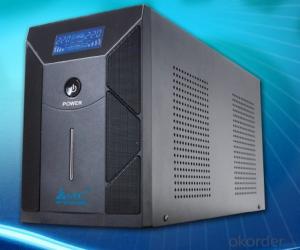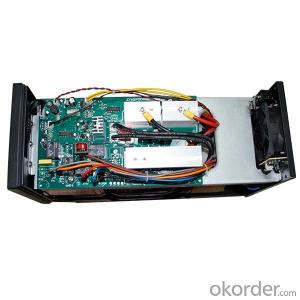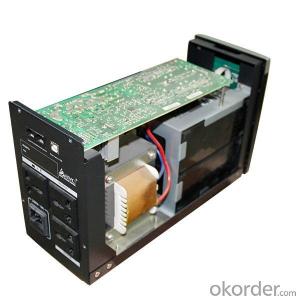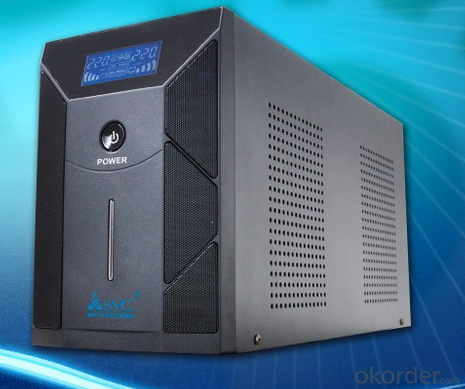Solar Energy Systems Gilbert - Portable Line Interactive Eco 2KVA Computer Battery Home UPS Sine Wave
- Loading Port:
- China main port
- Payment Terms:
- TT OR LC
- Min Order Qty:
- 20 carton
- Supply Capability:
- 10000 carton/month
OKorder Service Pledge
OKorder Financial Service
You Might Also Like
Sine Wave Portable Line Interactive ECO 2KVA Computer Battery Home UPS

| Model | V-2000 | V-3000 | ||
| Capacity | 2000VA/1200W | 3000VA/1800W | ||
| INPUT | ||||
| Input voltage | 110/120Vac or 220/230/240Vac | |||
| Input voltage range | 85~150Vac/175~275Vac | |||
| Frequency range | 60/50Hz/(Auto sensing) | |||
| OUTPUT | ||||
| Output voltage | 110/120Vac or 220/230/240Vac | |||
| Output voltage range | 102~132Vac/200~255Vac | |||
| Output frequency | 60±0.5Hz or 50±0.5Hz(Batt.mode) | |||
| Output wave form | PWM(Batt. mode) | |||
| Transfer time | Typical 2-6ms,10ms max | |||
| BATTERY | ||||
| QTY.&capacity of battery | 12V/7AII×4pcs | 12V/9AII×4pcs | ||
| Charging period | 4-6 hours recover to 90% capacity | |||
| PROTECTION | ||||
| Full Protention | Low voltage&overload&short circuit protection | |||
| PHYSICAL | ||||
| Net weight (kg) | 18.0 | 20.0 | ||
| Unit dimention (mm) | 340*110*265 | |||
| ENVIRONMENT | ||||
| Environment of performance | Temperature 0℃~40℃, Humidity 20%~90% | |||
| Noise level | ≤ 40dB(lm) | |||
| MANAGEMENT | ||||
| LCD or LED, RJ45/11 & USB | Optional | |||
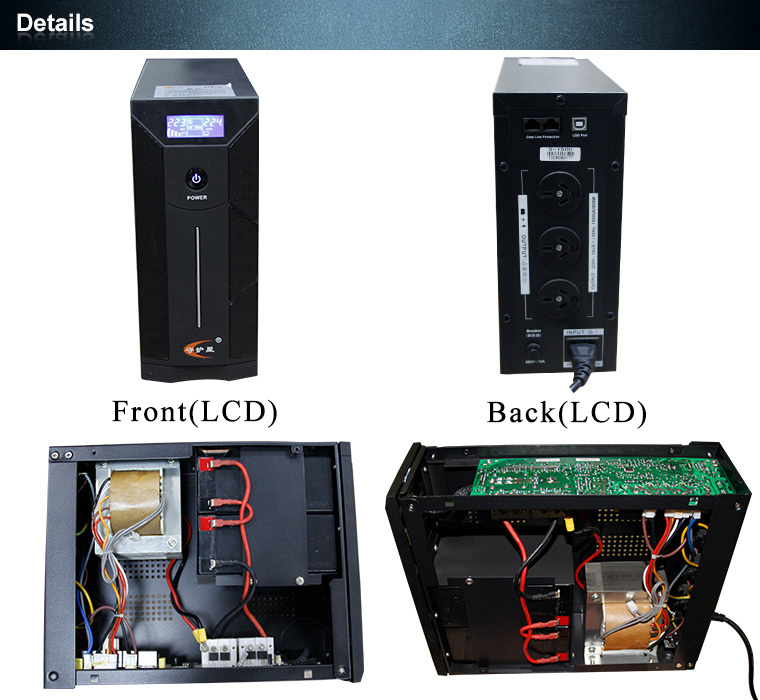

1. Wide range of input voltage
The UPS can offer normal and stable service voltage under its input voltage range. When the input voltage is out of its range the machine will switch to battery mode automatically to keep the output power in order to protect the equipment, such as computers, ensure they will not be damaged by the over high or over low voltage, users can continue the operation of equipment for a while or save the data on computers while the power network is abnormal.
2. Wide range of AVR(Automatic voltage regulation)
In the product’s input voltage range and under 3 steps of intelligent AVR function, it can provide a stable output voltage.
3. Automatic self detection when UPS on(LED).
Before the UPS on, red, yellow, blue LED will light up two times by cycle turns, after self detection UPS switch to AC mode/battery mode or working mode.
4. Silence function
In the "battery mode", shortly press the switch to turn off the buzzer. But the battery is about to run out or the load is too heavy, the buzzer sound cannot be muted.
5. Overload protection
In the battery mode, output voltage turn down correspondingly when it is overload, after the capacity of load is lower than the rated power then output voltage will back to rated value, it ensures the UPS will not shut down by abrupt overload which caused by surging current during the computer is working and other equipment is added.
6. Short circuit protection
When the mis-operation caused the load short circuit or computer failure (such as power tube breakdown of switch) cause short circuit, the UPS will shutdown automatically for protection.
7. The low current switch
This UPS adopts low current switch to extend the service life which is longer than conventional battery and high current switch in AC current path.
8. Automatic charging
There are two charging mode, charging time is faster than ordinary charging mode, higher efficiency, and greatly prolonging the service life of the battery.
9. With a bypass output
Independent bypass output socket for external printers or scanners of computer peripherals, with surge protection of the load.
- Q: Can a solar energy system be installed on a gas station or convenience store?
- Yes, a solar energy system can be installed on a gas station or convenience store. Many gas stations and convenience stores have already adopted solar power to reduce their energy costs and carbon footprint. Solar panels can be installed on rooftops or canopies, providing clean and renewable energy to power the operations of these establishments.
- Q: Do solar energy systems require grounding?
- Yes, solar energy systems do require grounding. Grounding is an essential safety measure for any electrical system, including solar energy systems. Grounding helps to protect the system from electrical faults, lightning strikes, and other potential hazards. In a solar energy system, grounding is typically done by connecting all metal components, such as solar panels, inverters, and racking systems, to a common ground. This is achieved by using grounding wires or cables that are connected to a grounding electrode, such as a grounding rod or a metal water pipe. Grounding serves several important purposes in solar energy systems. Firstly, it helps to protect against electrical shock hazards by providing a safe path for electrical currents in the event of a fault or malfunction. Grounding also helps to prevent damage to the system by redirecting lightning strikes or other electrical surges away from sensitive components. Furthermore, grounding is required by electrical codes and regulations. These codes ensure that solar energy systems are installed and operated safely and in compliance with industry standards. Failure to comply with grounding requirements can result in safety hazards, equipment damage, or even legal consequences. In summary, grounding is a necessary and important aspect of solar energy systems. It ensures the safety of the system and its operators, protects against electrical faults and lightning strikes, and ensures compliance with electrical codes and regulations.
- Q: Can a solar energy system be used to power electric vehicles?
- Yes, a solar energy system can be used to power electric vehicles. Solar panels can generate electricity that can be stored in batteries and used to charge the batteries of electric vehicles. This can provide a sustainable and renewable source of energy for powering electric vehicles.
- Q: Can solar energy systems be used for powering amusement parks?
- Yes, solar energy systems can definitely be used to power amusement parks. By installing solar panels, amusement parks can generate clean and renewable energy to meet their power needs. Solar energy systems can provide electricity for rides, lighting, and other facilities within the park, reducing the reliance on fossil fuels and lowering operational costs. Additionally, solar power can contribute to a greener image for the amusement park, attracting environmentally conscious visitors.
- Q: How does the efficiency of solar panels affect the performance of a solar energy system?
- The efficiency of solar panels plays a crucial role in determining the overall performance of a solar energy system. Higher efficiency panels are able to convert a greater amount of sunlight into electricity, resulting in increased energy production. This means that with more efficient panels, a solar energy system can generate more power and meet a greater portion of the electricity demand. One of the primary benefits of using highly efficient solar panels is that it allows for a smaller system size. Since more electricity is being produced per unit of panel area, fewer panels are needed to achieve the desired energy output. This not only saves installation space but also reduces the overall cost of the system. Additionally, a smaller system size means less maintenance and fewer potential points of failure, improving the reliability and longevity of the solar energy system. Furthermore, the efficiency of solar panels directly impacts the economic viability of a solar energy system. Higher efficiency panels generate more electricity, which can offset a greater portion of the energy consumption, resulting in reduced utility bills. In some cases, excess electricity can be fed back into the grid, allowing for net metering or even earning credits, further enhancing the financial benefits. A more efficient solar energy system can also provide a quicker return on investment, making it a more attractive option for homeowners and businesses alike. Moreover, the efficiency of solar panels has a significant impact on the environmental benefits of solar energy systems. By converting more sunlight into electricity, highly efficient panels can reduce the reliance on fossil fuel-based power generation, thus decreasing greenhouse gas emissions and contributing to a cleaner and more sustainable energy future. This positive environmental impact is crucial in combating climate change and minimizing the ecological footprint associated with energy consumption. In summary, the efficiency of solar panels directly affects the performance of a solar energy system. Higher efficiency panels lead to increased energy production, smaller system sizes, reduced costs, and improved financial returns. Moreover, they contribute to a more sustainable future by reducing reliance on fossil fuels and lowering greenhouse gas emissions. Therefore, investing in highly efficient solar panels is essential for maximizing the effectiveness and benefits of a solar energy system.
- Q: Can solar energy systems be used in areas with limited space on rooftops due to existing equipment or structures?
- Solar energy systems can still be utilized in areas with limited rooftop space due to existing equipment or structures. In such instances, alternative approaches can be employed to optimize the use of available space. One possibility is to opt for ground-mounted systems rather than rooftop installations. These systems can be positioned in open areas adjacent to buildings or even on unused land nearby. Moreover, solar canopies or awnings can be set up in parking lots or other open spaces to generate solar power. These structures can be designed to offer shade and shelter while simultaneously harnessing solar energy. Consequently, even in areas with limited rooftop space, there are diverse and innovative options to implement solar energy systems.
- Q: Can solar energy systems be used in areas with limited access to solar energy training programs?
- Yes, solar energy systems can still be used in areas with limited access to solar energy training programs. While formal training programs can be helpful in understanding the technical aspects of solar energy systems and their installation, there are various resources available online, such as tutorials, videos, and manuals, that can provide guidance and knowledge on setting up and maintaining solar energy systems. Additionally, local experts or organizations with experience in solar energy can provide assistance and support in these areas, even without formal training programs.
- Q: Can solar energy systems be used to power an entire home?
- Yes, solar energy systems can be used to power an entire home. With the right setup and sufficient solar panels, a solar energy system can generate enough electricity to meet the energy needs of a household. This can include powering appliances, lighting, heating, cooling, and other electrical devices in a home.
- Q: How do solar energy systems affect the installation of satellite dishes?
- Solar energy systems can potentially impact the installation of satellite dishes by obstructing the line of sight between the satellite and the dish. This obstruction can cause signal interference or loss, affecting the satellite dish's performance. However, with proper planning and positioning of both the solar panels and the dish, it is possible to minimize any potential conflicts and ensure optimal functioning of both systems.
- Q: How efficient are solar energy systems?
- Solar energy systems are highly efficient as they convert sunlight directly into electricity or heat without any emissions or moving parts. They have an average efficiency of 15-20% for solar panels, but advanced technologies can achieve efficiencies of up to 40%. Additionally, solar systems can be optimally designed and integrated to maximize their efficiency and energy output.
Send your message to us
Solar Energy Systems Gilbert - Portable Line Interactive Eco 2KVA Computer Battery Home UPS Sine Wave
- Loading Port:
- China main port
- Payment Terms:
- TT OR LC
- Min Order Qty:
- 20 carton
- Supply Capability:
- 10000 carton/month
OKorder Service Pledge
OKorder Financial Service
Similar products
Hot products
Hot Searches
Related keywords
